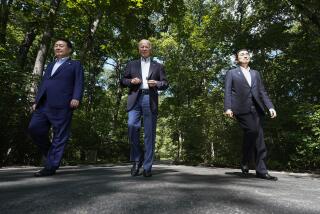In a ‘Dual Power’ Era, Summit Speaks Loudly to Foes of Gorbachev
- Share via
How much the Moscow jockeying over the on-off-apparently on summit meeting is a matter of Soviet attempts to extract concessions from President Reagan on the Strategic Defense Initiative is still not clear. It almost certainly had a part to play, for the Soviet leadership feels at least as strongly about this issue as Reagan does. In the Soviet Union, however, as well as in the United States, summitry is not just about arms control. There are factors at work here that have more to do with Soviet domestic politics than with foreign and defense politics.
Summit meetings--or, to be more precise, successful summit meetings--widen the authority gap between a general secretary and the other members of the Politburo. Mikhail S. Gorbachev’s support within the Soviet Union is never stronger than when he is representing his country in top-level talks with the other super-power. Yet there are many of his colleagues and subordinates who have no interest in watching him enhance his prestige still further. They do not want to see him turn to domestic advantage his enjoyment of the international limelight while those who are acting as a brake on reform are confined to the shade.
Whatever reservations the military may have about some of the concessions made by the civilian leadership over the past two years, the Soviet defense Establishment is more firmly subordinated to political control than ever. It is in the field of domestic reforms that Gorbachev is encountering his most serious resistance. He has made it increasingly clear that his views are close to those of the more radical reformers within the Soviet Communist Party who accept the need for a significant market element within the Soviet economy, for political reform that will include competitive elections (albeit within circumscribed limits) and for a greater tolerance of diverse and critical opinions.
Gorbachev has even broken new ideological ground for a Soviet party leader by twice using the word pluralism in a positive context, though he limited it to support for a “socialist pluralism.” But it was, after all, a socialist pluralism that the Czech communist reformers of 1968 were trying to establish, and ever since the Prague Spring both the theory and the practice of pluralism have been especially severely attacked by Soviet ideologists.
The struggle between old and new ideas in the Soviet Union and for political as well as economic reform is intensifying. It has become ever clearer to Gorbachev and his supporters that, since basic changes in the structure and functioning of the economic system will bring more pain than pleasure in the short run, the economic reform runs a serious danger of being emasculated by a combination of bureaucratic and working-class resistance unless support can be galvanized through political changes.
The stage that perestroika (reconstruction) has reached is one in which the reformers are determined to give legal embodiment to changes that so far may be regarded as rhetorical, reversible and atmospheric. Thus they want not only a continuation and development of glasnost but a law specifying citizens’ rights to obtain information from state bodies. In addition, they are discussing a new press law, an electoral law and a law on referendums.
The extent and the shape of this legislation are likely to be the subject of argument between now and the Soviet Communist Party’s special conference called for June, 1988.
Gorbachev himself has spoken of the present period as critical for the determination of the fate of perestroika. On that he is surely right. Though he succeeded this June in getting one of his closest allies and strongest supporters of domestic reform, Alexander Yakovlev, elected to full membership of the Politburo and a week ago was able to pension off the much more ambivalent Geidar Aliyev, his very successes have made those who are worried by the speed and direction of change dig their heels in more deeply.
A prominent Soviet economic reformer, in conversation with me in Moscow recently, described the present time as one of “dual power.” The phrase recalls the period in 1917 when power was divided between the provisional government and the Petrograd Soviet. At present, he said, “The leadership is for perestroika and the apparatus is against.” Even that underestimates the obstacles in Gorbachev’s path, for the leadership itself is divided in its attitude toward reform, and the limits that it wants to impose on it. Gorbachev has his own majority among the secretaries on the Central Committee, but not yet on the Politburo.
Since Gorbachev is a consummately skillful politician, and since it is no longer a state secret that the un reformed Soviet system is not working, his victory over his conservative opponents may well have become decisive by the time the 1988 party conference is over. But he is not there yet, and in the meantime he has a need for summit talks--as distinct from arms-control agreements that may be reached independently--mainly to the extent that they help him in his domestic struggles.
More to Read
Sign up for Essential California
The most important California stories and recommendations in your inbox every morning.
You may occasionally receive promotional content from the Los Angeles Times.










